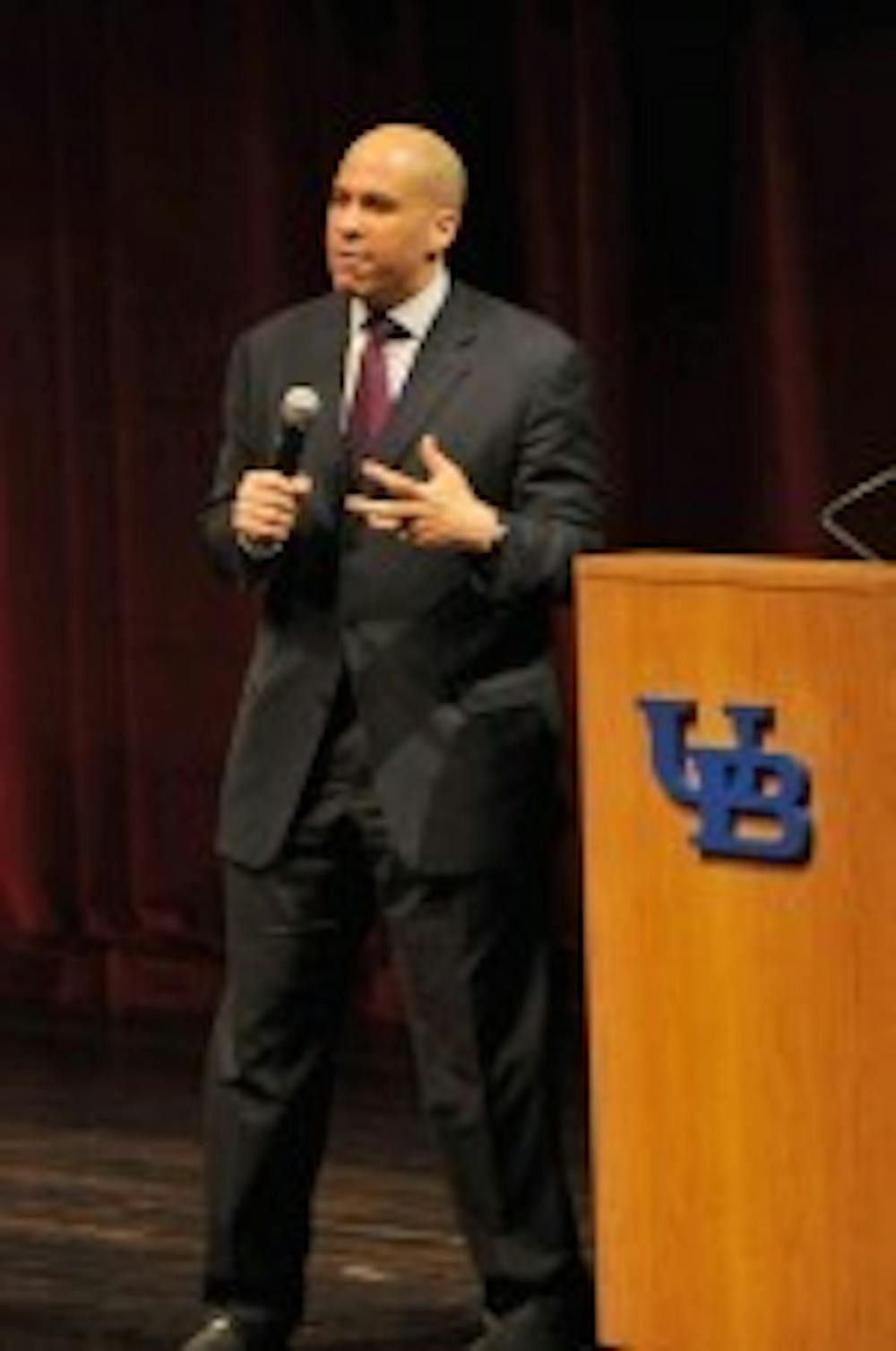The spirit of Dr. Martin Luther King Jr.'s dream was in full force on Wednesday as the mayor of Newark, N.J., Cory Booker, took the stage as part of the 24th annual University at Buffalo Distinguished Speakers Series and the 35th annual Martin Luther King Jr. Commemoration Event.
Booker's credentials preceded him even before taking the stage. In an introduction, Mary H. Gresham, dean of the UB Graduate School of Education, gave an overview of his accomplishments that garnered audible gasps from the audience. Since his election in 2006, his innovative programs and policies have drastically reduced crime in Newark, and the city has undergone an urban renewal that has become the envy of many other cities in the U.S.
"He is accessible, genuine and inclusive in his leadership," Gresham said.
The welcome speech was a crescendo to the moment when Booker burst onto the stage, loud and excited to speak. He described the dilemma that he and other blacks face from their relationship with the civil rights generation through a joke that his father told him as a child: that he was born on third base, but he didn't hit a triple.
He described how his parents instilled a sense of responsibility in him, telling him that he was not born to be the same, but to be different.
"You should strive for greatness," Booker said. "This is a country where exceptionalism is critical."
His unique sense of responsibility led him to take action in a way that many would fear after he graduated from Yale Law School in 1997. He moved into a troubled housing project called Brick Towers, where he believed he could be in the middle of urban struggle.
It was there that he befriended the old tenant president, the late Virginia Jones. When they first met, Booker told her that he was there to help her. She took him down to the street and told him to look around and tell her what he saw. He described to her all the urban decay around him; abandoned buildings, graffiti, and drug dealers, and she told him that he couldn't help her.
She was trying to tell him to look for the good in where he was, rather than focus on the bad.
"We get so caught up in what other people are doing or not doing," Booker said. "Yet we leave the next day and walk past reality."
Stories that interested Booker most were not of big singular acts, but of small hopeful acts of generosity and determination. One was of a man who lived near an empty lot that had become overgrown and dilapidated.
The lot had become a haven for drug dealers and other criminal activity, and rather than ignore the situation, he decided to do something about it. With his federal stimulus check, he bought a lawnmower. Each day he mowed, gardened and took care of the lot until the drug dealers left the area.
"Courage is every day getting up and doing what is required then doing the small acts of generosity and love," Booker said.
His views on current politics drew cheers and applause from the audience, especially when he said that the worst thing a politician could do is to constantly think about the next office. The toxic and divisive politics had to stop, especially the "win at all costs" attitude, he argued.
He challenged the country to stop focusing on left versus right politics, and to overcome the cynicism that dominates discussion. Rather than bad-mouth his biggest opponent, New Jersey Governor Chris Christie, he chose to talk about issues that they came together and found solutions on.
"I really liked his view on politics," said Philip Mathew, senior exercise science major. "Especially that we should take into consideration what other people have to say."
Booker's most poignant story turned out to be one about the state of the nation as a whole. Running late, one of his aides foolishly told him it was impossible to make a flight. Booker took this as a challenge, and rushed to the airport. Arriving at the airport with only minutes to spare, a ticket agent told him he had no way to make the flight on time, but he did not give up.
He rushed to the gate where another airport worker told him he couldn't get on the flight, but he convinced her to let him on anyway, and since the only seat left was on first class, he was seated there. Once onboard, he learned that he was actually on the wrong flight. His example served as a warning not for air travel, but for national activism.
"We are a first class nation," Booker said. "But are we headed in the right direction?"
Email: features@ubspectrum.com





